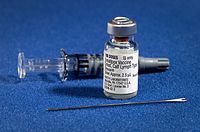
Photo from wikipedia
Severe acute respiratory syndrome coronavirus (SARS‐CoV), Middle East respiratory syndrome coronavirus (MERS‐CoV), and the current severe acute respiratory syndrome coronavirus 2 (SARS‐CoV‐2) are the most impactful coronaviruses in human history,… Click to show full abstract
Severe acute respiratory syndrome coronavirus (SARS‐CoV), Middle East respiratory syndrome coronavirus (MERS‐CoV), and the current severe acute respiratory syndrome coronavirus 2 (SARS‐CoV‐2) are the most impactful coronaviruses in human history, especially the latter, which brings revolutionary changes to human vaccinology. Due to its high infectivity, the virus spreads rapidly throughout the world and was declared a pandemic in March 2020. A vaccine would normally take more than 10 years to be developed. As such, there is no vaccine available for SARS‐CoV and MERS‐CoV. Currently, 10 vaccines have been approved for emergency use by World Health Organization (WHO) against SARS‐CoV‐2. Virus‐like particle (VLP)s are nanoparticles resembling the native virus but devoid of the viral genome. Due to their self‐adjuvanting properties, VLPs have been explored extensively for vaccine development. However, none of the approved vaccines against SARS‐CoV‐2 was based on VLP and only 4% of the vaccine candidates in clinical trials were based on VLPs. In the current review, we focused on discussing the major advances in the development of VLP‐based vaccine candidates against the SARS‐CoV, MERS‐CoV, and SARS‐CoV‐2, including those in clinical and pre‐clinical studies, to give a comprehensive overview of the VLP‐based vaccines against the coronaviruses.
Journal Title: Biotechnology Progress
Year Published: 2022
Link to full text (if available)
Share on Social Media: Sign Up to like & get
recommendations!